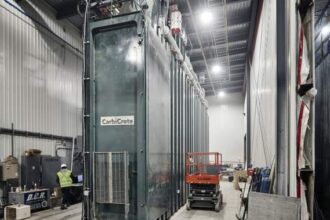The rain-soaked construction site in downtown Vancouver tells a familiar story across Canada’s building sector. Fewer hard hats in sight, more digital tablets, and a growing reliance on automation. According to a revealing new KPMG survey released Tuesday, nearly 80% of Canadian construction firms are accelerating technology investments to counter a critical labour gap that continues to throttle industry growth.
“We’re witnessing a fundamental shift in how building gets done,” explains Mahesh Krishnan, KPMG’s National Industry Leader for Building, Construction and Real Estate. “The days of simply throwing more bodies at a project are over. Companies are strategically deploying tech solutions that allow them to do more with fewer people.”
The nationwide survey of 131 construction executives paints a vivid picture of an industry at a crossroads. A staggering 78% report increasing technology investments specifically to address workforce shortages, while 72% acknowledge they currently lack adequate staffing to meet project demands. This technological pivot represents both necessity and opportunity in a sector traditionally resistant to digital transformation.
At Westbrook Development’s latest Toronto condominium project, the evidence is unmistakable. Drones buzz overhead capturing daily progress data, workers consult augmented reality displays for installation specifications, and project managers track material deliveries through integrated software platforms.
“Five years ago, we’d have 40 more people on this site,” notes site supervisor Jasmine Chen. “Today, we’re completing phases faster with a leaner team because the tech handles what used to require multiple specialists.”
The survey reveals construction firms are prioritizing three key technological areas: project management software (82%), building information modeling (76%), and prefabrication technologies (68%). These investments allow companies to streamline workflows, reduce errors, and complete projects with smaller crews.
This technological evolution isn’t merely about efficiency. With Canada needing an estimated 304,000 new construction workers by 2030 according to BuildForce Canada, and retirements outpacing new entrants, the industry faces an existential threat without intervention.
“We’re seeing construction firms realize technology isn’t just a nice-to-have anymore,” says Krishnan. “It’s survival. Companies that resist digital transformation simply won’t be competitive in three to five years.”
The financial implications are substantial. The KPMG report indicates 64% of construction companies have increased technology budgets by more than 20% compared to pre-pandemic levels. The Canadian construction technology market now exceeds $3.8 billion annually, growing at roughly 14% per year.
However, challenges remain. The survey highlights that 58% of firms struggle with technology implementation, citing integration difficulties with existing systems and resistance from veteran workers. Additionally, 49% report difficulty finding personnel with both construction knowledge and technological literacy.
“The skills gap is evolving,” explains Krishnan. “We need people who understand both building science and digital systems. Educational institutions are scrambling to develop programs that produce this hybrid skill set.”
The technology adoption isn’t limited to large national contractors. Medium-sized regional firms show the highest growth rate in tech spending, increasing budgets by an average of 24% annually. These companies typically focus on automation tools that provide immediate efficiency gains like equipment tracking, advanced scheduling software, and digital documentation systems.
For an industry that has historically lagged in productivity growth compared to manufacturing and other sectors, the current transformation represents a potential watershed moment. The KPMG survey suggests construction companies embracing technology are reporting productivity improvements between 14-23% within two years of implementation.
As Canada faces mounting pressure to address housing shortages and aging infrastructure, the construction industry’s technological revolution couldn’t come at a more critical time. The question now isn’t whether technology will transform construction, but rather which companies will successfully navigate the digital transition—and which will be left behind in the concrete dust.
For more on how technology is reshaping Canadian industries, visit CO24 Business or follow our ongoing coverage of construction innovation at CO24 Breaking News.


















